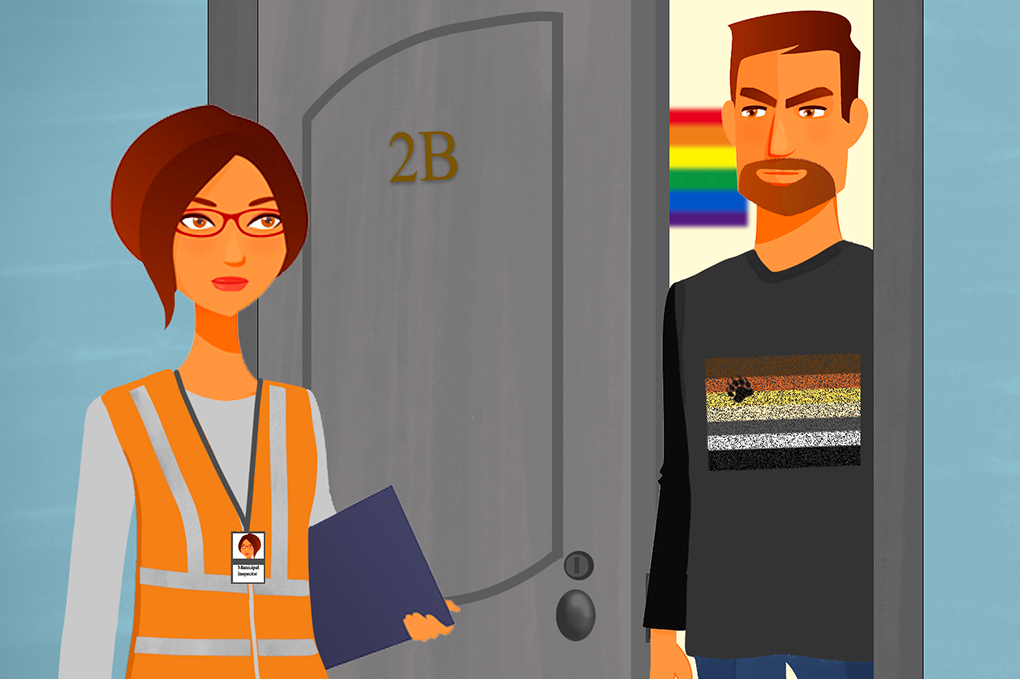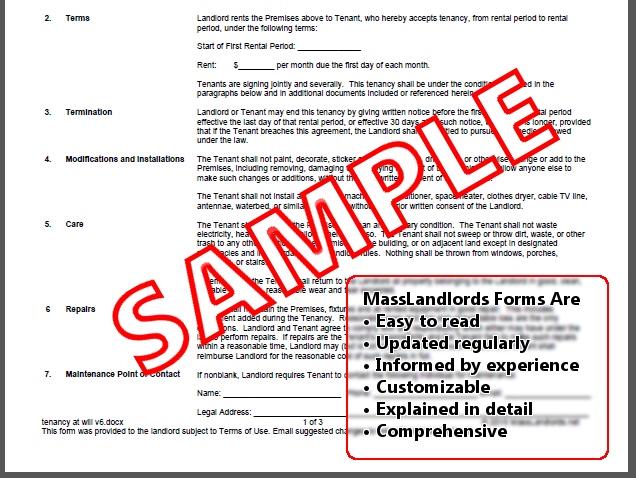Notice of Occupant Right To Refuse Town or City Inspection
The “Notice of Occupant Right to Refuse Municipal Inspection” should be included with every rental agreement or handed out separately to new renters. This notice details the circumstances under which an occupant must admit you as the landlord or your agent. This notice also explains how, if there is no emergency, they can require a city or town official to get an administrative warrant before granting access to the rental.

We all have a right to privacy, including renters. If the city or town asks to go into your home, they don’t have the rights a landlord would have. You can refuse until they get a warrant. Derivative of 123rf.
Why use this form?
This notice is important for many reasons, chief among them the existence of rental registries. Many Massachusetts towns and cities have enacted or are considering enacting rental registries (Amherst, Boston, Worcester, etc.). Advocates for these registries claim to speak on behalf of renters. They say we need preemptive inspections for public safety, because renters don’t call in complaints themselves.
Actually, if renters aren’t calling in complaints, it’s probably because they value their privacy and time more than the repair. Ask any renter whether they want someone in their home to snoop around, and the answer will be “no.” Ask them who they normally call for maintenance, and the answer will be “the landlord.” Town and city officials don’t fix things. Landlords fix things. If the landlord is unresponsive, the renter can call the town or city, but the landlord still has to come in.
What does this form do?
This form clearly states when renters must allow a public official into their home. It's far less often than proponents of registries would care to admit.
As a notice of rights, we are careful not to overstep. We are not recommending that renters refuse town or city officials. But we want to be clear that renters have a right to deny entry to the public if they should so choose.
Landlords should give this form to renters not because it’s a legal requirement (it is not). We just want you to take an active role in protecting both privacy rights and property rights.
Doesn’t the state sanitary code require regular inspections?
No, 105 CMR 410, the state sanitary code, section 410.600, calls for “inspection upon request.”
What about means of egress?
Totally separate from the state sanitary code, 780 CMR 1001.3.2 requires five-year inspections for emergency exits. In most cases, these can be conducted without entering the unit just by looking at common areas.
What about the building code or a Section 110 inspection?
The state building code, 780 CMR 110.7, contains wording about “periodic inspections” on page 18. (If that link rots, try this one.) The state code modifies the 2015 International Building Code (IBC). Does this apply? Not the way most people think, for three reasons:
- First, Section 110 calls for reinspecting permitted work in existing buildings, but permits cannot be reinspected in full once the walls are closed, so the whole section is a garbage regulation. It calls for reinspection of whatever permitted work still exists and is visible, a small sliver and what folks think.
- Second, in any case, Section 110 does not apply to single-family rentals or two-unit buildings.
- Third, Section 110 does not reference the sanitary code, or anything similar, with respect to rental units.
Under IBC 2015 as modified by Massachusetts, periodic inspections fall under the parent Section 110, which begins, “Construction or work for which a permit is required shall be subject to inspection by the building official and such construction or work shall remain accessible and exposed for inspection purposes until approved” (emphasis added). Once the work is finished and the walls are closed, there is no longer anything to inspect. Hold that thought.
Section 110.7 requires periodic inspections of “existing structures,” with a maximum certification duration of five years. This is what inspectors cite as proof they can enter. But remember, the context is permitted work. If the walls are closed and the work is finally approved, there is nothing to inspect anymore. If the work was never permitted (e.g., preexisting nonconforming work, think “1890 three-decker”) there is nothing to inspect here, either. Towns or cities should not be reinspecting whole buildings and preexisting work under Section 110.
What about the table calling for inspections of multifamilies? Under the 2015 code, “multifamily” is defined as “residential group R-2 occupancies containing sleeping units or more than two dwelling units where the occupants are primarily permanent in nature.” (Don’t be distracted by the word “permanent.” Here use of the word “permanent” is in contrast with the term “transient” used in the definition of R-1, which refers to hotels. Renters count as “permanent.”) Put simply, despite the code saying “multifamily,” the legal definition exempts all two-unit buildings and single families used for rentals. Section 110 gives absolutely no basis for periodic inspection of such buildings.
For three units and above, or rooming houses, are inspections required? Maybe, but still they wouldn't be inspecting for compliance with the sanitary code. They'd be reinspecting for the building code.
Note 3 in the table reads, for “R-2 Multi-family... [inspections shall be] Prior to issuance of new certificate.” The building code for multifamilies is intended to be inspected only as part of closing out a building permit. This is not a sanitary code inspection.
What about the “maximum certification period” of five years? Note 5 says this is “intended to provide administrative flexibility.” They give examples of how inspections can be at a more frequent interval. This clearly shows an intent that something should be inspected.
Unfortunately, though, because the building code is not the state sanitary code, and does not reference it, we cannot easily see any authority for periodic inspections of the sanitary code.
In summary, if a renter in a three-unit or above is asked to permit access specifically for a 110 inspection, the need to get an administrative warrant still applies, and then only for the building code.
What if the town or city just wants to inspect?
They can get a warrant. When in doubt, talk with an attorney. Did we get something wrong? Send us the citation at hello@masslandlords.net, and we will correct this article.
Revisions
- v1
- Original version.
To view this form, you must be logged-in and a member in good standing

MassLandlords is a nonprofit dedicated to helping owners rent their property. We try our best, but we can't guarantee these forms will always work. We provide legal information but never advice particular to your situation. Nothing on this site is meant to create an attorney-client relationship. We advise you consult with an attorney.




